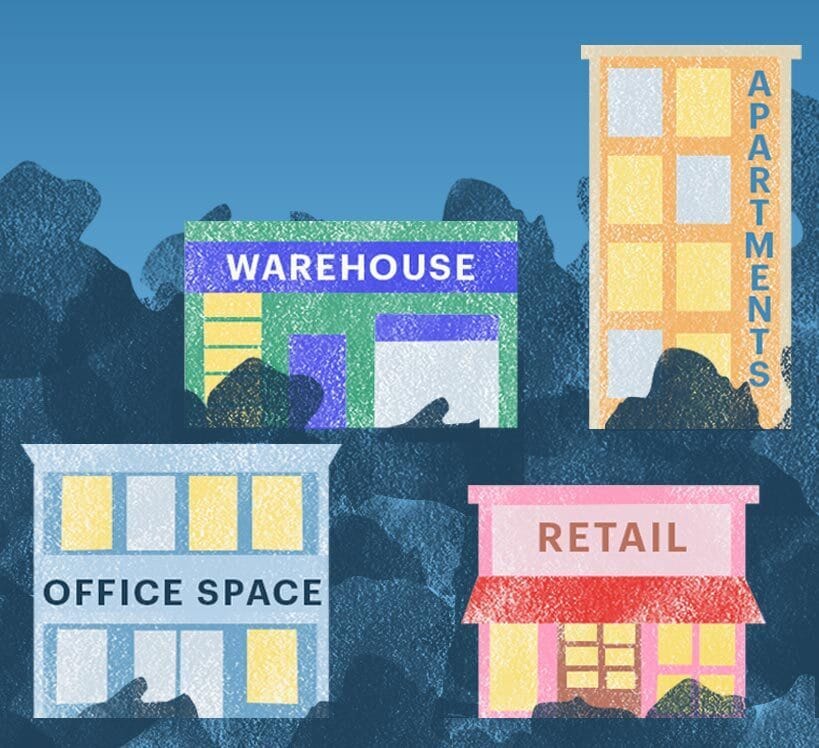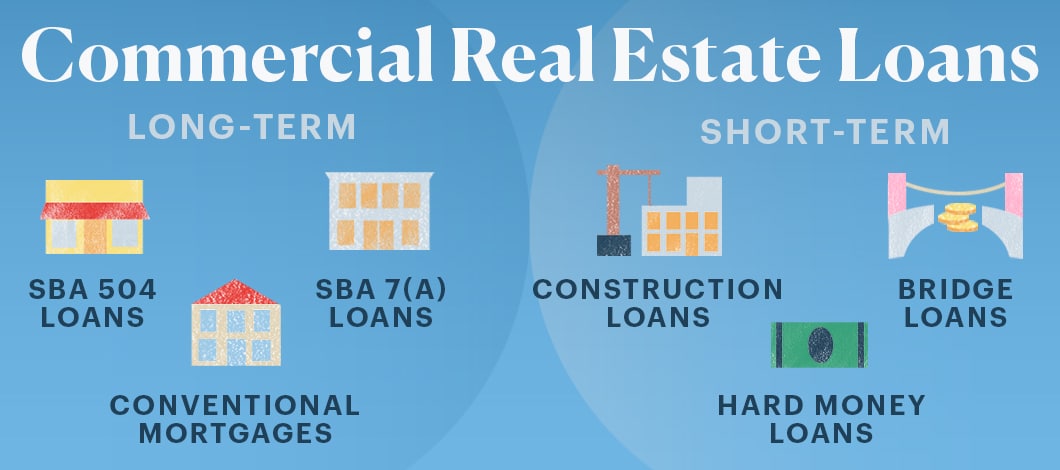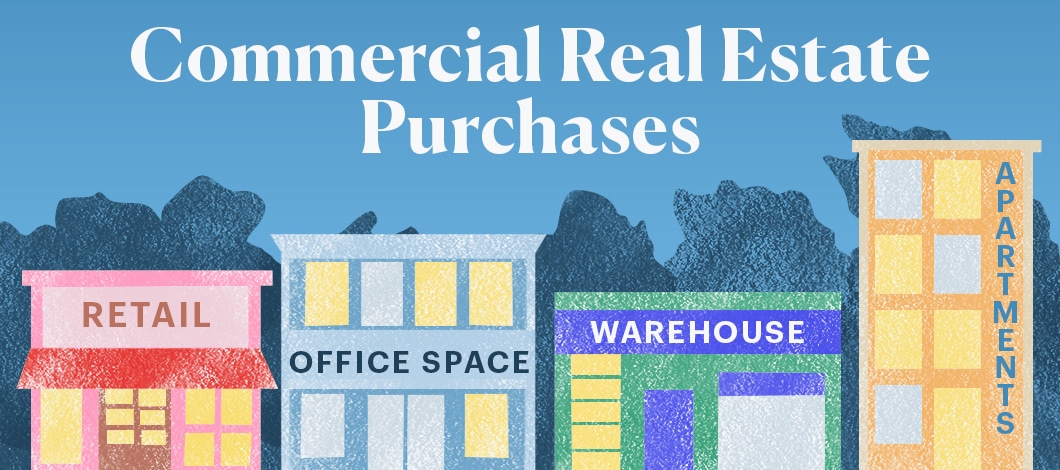Commercial real estate loan rates today are relatively low compared to previous eras. Depending on your creditworthiness and the type of loan you’re applying for, real estate loan rates and commercial mortgage rates range anywhere from around 3% to about 15%. The difference could mean hundreds of thousands of dollars added to your bottom line, so it’s important to know what goes into calculating commercial real estate loan rates.
If you’re wondering, “What is the current interest rate for commercial mortgages?” this guide will tell you all you need to know. We’ll review how financing type, loan amount, repayment length and credit utilization combine with your credit score and other factors to impact the commercial mortgage rates and terms a lender offers.
Small Business Tip:
Most lenders use prime rates to set commercial real estate interest rates. Keep in mind that the prime rate fluctuates based on the economy’s condition. The current prime rate is 7.5% as of Dec. 15, 2022.
Any additional interest charges above prime will be in accordance with your creditworthiness and the lender’s financing terms.
Commercial Real Estate Loan Types and Interest Rates
So, what are the current commercial mortgage rates? While it’s possible to get an idea of averages, every case is unique.
Here’s a breakdown of current commercial loan rates you’ll encounter in the market today, broken down by loan and property types.
Average Commercial Loan Rates by Financing Type
| Financing Type* | Average Rates | Common Loan-to-Value Ratio | Maximum Term Lengths |
| Bank financing | 5%-7% | 80% | 10 years |
| SBA 7(a) loans | 5.5%-11.25% | 85% | 25 years |
| SBA CDC/504 loans | 2.231%-2.399% | 90% | 25 years |
| Construction loan | 4.75%-9.75% | 75% | 1-3 years |
| Commercial bridge financing | 4.2%-13.2% | 80% | 3 years |
| Hard-money loan | 10%-18% | 60%-80% | 1 year |
*Commercial Lending Rates from ValuePenguin
Average Commercial Loan Interest Rates by Property Type
| Building Type** | Average Rates |
| Retail spaces, offices, apartments, industrial spaces and hotels | 3%-14.83% |
| Hospitals | 3%-8.43% |
** Commercial Lending Rates from Commercial Loan Direct
Conventional Bank Loans
Banks are the gold standard of commercial real estate lending. Generally, banks offer the most competitive commercial real estate loan rates — starting at an average of 5%.
Bank loans can come with fixed or variable rates, which would reset at periodic intervals noted in your loan agreement, for example, every year or every 5 years.
For qualified borrowers, banks typically offer up to an 80% loan-to-value ratio (LTV), the percentage of a property’s value a lender is willing to finance. That means you’d have to come up with a 20% down payment.
It’s not uncommon for some banks to require potential commercial borrowers to have a credit score above 700, multiple years in business and significant annual revenue to qualify for bank financing.
SBA Loans
When it comes to Small Business Administration (SBA) commercial real estate loans, there are 2 options: 7(a) and CDC/504 programs. Each option has its conditions and rates.
These programs open access to funding for small businesses that don’t qualify for conventional loans. That’s because the SBA guarantees a portion of the loan, which mitigates the lender’s risk and helps you get funding.
This doesn’t mean SBA-backed loans are easy to obtain, however. To be considered, you’ll typically need a minimum credit score of 650 and must have a positive and lengthy business history as well as a strong business plan.
If you don’t have a deep reserve of capital for a down payment, SBA loans may be an option. SBA 7(a) and CDC/504 loan down payment minimums start at 10%.
Related: SBA Loan Requirements: Is Your Business Eligible?
SBA 7(a) Loans
The 7(a) program is the most popular of all SBA initiatives.
The SBA sets interest for 7(a) funding to the current prime rate. Commercial property loan rates can be fixed or variable, depending on your qualifications, and will get lower as your principal amount rises.
Generally, you could expect these SBA commercial loan rates for real estate to be between 5.5% and 11.25%.
The typical LTV ratio for this financing is about 80%.
CDC/504 Loans
SBA 504 loans are used for fixed assets, such as equipment and real estate. Therefore, these loans are an excellent option for those in the market for commercial real estate.
This program is fulfilled by 2 separate lenders. A Certified Development Company (CDC) works with the SBA to provide 40% of the loan while a bank covers 50% or more. The borrower must put down 10%, although some may have to put down up to 15% or 20%.
The CDC-backed portions of 504 loans have interest fixed slightly over the current Treasury rate. However, for the bank’s contribution, there is no set cap, and you’ll have to negotiate the rates and fees independent of the CDC. Generally, commercial mortgage interest rates are comparable to other mortgage financing packages.
Construction Loans
If your business’s physical location is being built, you can apply for a construction loan to cover permits, building materials and labor costs. This financing covers construction costs, so terms are shorter — usually the length of the building project.
Rates can range from 4.75%–9.75% but could be higher. That’s because construction loans are high risk. A lot can go wrong when constructing a property, such as material price increases, blown timelines and the project not being completed in accordance with the appraisal report. Lenders will also require a down payment on construction loans, ranging from 10%–30%.
If you need a mortgage once construction is complete, you can apply for a construction-to-permanent loan, which is financing that converts to a traditional mortgage (e.g., with 15- or 30-year terms) when the project is complete.
Keep the following points in mind if you want to apply for a construction loan for your commercial real estate project:
- Have detailed plans ready: Lenders will want to see all aspects of your construction project plans, including floor plans and other blueprints, builder information, schedules and a budget, before approving your application.
- Funding isn’t released in a lump sum: Unlike other financing options, your approved funding amount isn’t provided upfront. Instead, the lender releases funds after completing specific construction milestones (e.g., framing). You’ll be responsible for paying interest on the released financing throughout your loan term, and the principal must be paid off at the loan term’s end.
- Not every lender offers construction loan programs: If you think a construction loan will help you achieve your commercial real estate goals, research (or contact) commercial mortgage lenders to ensure they offer this type of financing.
Commercial Bridge Financing
Short-term bridge loans are commonly issued by local banks or online lenders. They’re used to purchase or rehabilitate commercial property, but they’re not a long-term financing solution.
You’ll have an abbreviated term length with a commercial bridge loan, sometimes as short as 6 months. However, regardless of the term, lenders typically charge higher upfront fees and interest. The average rate for commercial bridge loans ranges from 4.2%–13.2%.
Additionally, unlike conventional commercial financing, bridge loans are often based on the loan-to-cost ratio or after-repair value of a property instead of the LTV ratio.
Hard-Money Loans
Because most borrowers in the real estate market don’t have large amounts of cash immediately on hand, some turn to private companies or investors — instead of banks or other lending institutions — to help finance their new properties.
These commercial real estate loan rates are higher than others because lenders incur greater risk providing capital upfront to fund your real estate investment, often overlooking low credit scores and other financial factors in favor of the property that will be used as collateral. To offset this risk, hard-money lenders could charge you 10%–20% in interest.
-
Online Marketplace Loans
If your small business can’t qualify for a conventional commercial mortgage or you need money fast to jump on a hot real estate opportunity, online lending marketplaces, such as Fast Capital 360, might be your best option for buying real estate.These companies match you with the right lender inside their network. This simple, streamlined process could get you funding in a shorter amount of time.
More importantly, you avoid shopping around for different commercial real estate loan rates and terms. Based on your creditworthiness, you may qualify for an online loan with an interest rate starting at 7%.
Factors Affecting Your Commercial Real Estate Loan Rates
Commercial property mortgage loan rates and terms are based on multiple criteria. Your creditworthiness, the principal size and term, the economic climate and other factors can affect quoted interest rates. Let’s look at what lenders want and how it applies to your situation to help you obtain optimal financing terms.
Credit Score
Your business and personal credit histories help determine which commercial real estate lenders will work with you — and at what interest rate. Showing an ability to incur and pay off debt is attractive to lenders and can help you qualify for higher funding amounts and lower commercial real estate loan rates.
To be approved for a bank or government-backed financing program, you’ll need a good credit score. Keep in mind, a “good” credit score is at least 670 on the FICO scale, and a “fair” score ranges from 580-669, according to Experian. That said, other lenders can work with you if you have a low score, but the commercial building loan rates will get considerably higher.
If you’re worried about being denied financing or given high commercial property interest rates, make an effort to raise your credit score before applying for a commercial real estate loan.
Related: Bad Credit Business Loans: These Are Your 5 Best Options
Loan Details
Your repayment term’s initial principal amount and length are considered when determining your commercial real estate loan interest rate. In general, longer-term commercial loans will have lower interest rates, while shorter-term commercial loans will have higher interest rates.
Additionally, the more creditworthy you are as a borrower, the more likely you’ll be approved for a more extended repayment period. Also, those who qualify for more significant principal amounts may be approved for lower interest rates.
Most lower-value, short-term options are offered to less-qualified borrowers. Because the lender is taking on more risk in those situations, they’ll charge higher commercial real estate loan rates. A short-term loan can carry rates starting at 10% or higher in some cases.
Loan-to-Value Ratio
The following example demonstrates how LTV impacts overall commercial mortgage rates.
A lender offering a 75% LTV is willing to finance three-quarters of the total value of the building you’re buying. That means if you want to purchase a $400,000 property, they’ll lend you $300,000.
LTV is used to determine how risky the investment is for the lender. A higher ratio means the lender has more invested in the property, thus increasing their risk in the case of default. A higher down payment will mitigate this risk and may lead to lower commercial real estate loan rates.
Depending on which type of commercial real estate loan you qualify for and the lender’s unique terms, you can expect to receive an LTV of 50%–90%.
After-Repair-Value Ratio
After-repair-value (ARV) is the perceived value of the commercial property after renovations. When a developer looks to rehabilitate a property or a small business owner plans to renovate an office building, the ARV ratio comes into play.
Say your lender offers you an ARV of 60%. If the property is valued at $500,000 after repairs, you will receive $300,000 in financing.
For buyers or investors purchasing a property to rehabilitate, offering no more than 70% of the ARV minus repair costs is recommended.
How Commercial Real Estate Loan Rates Are Calculated
There are a few common ways interest is worked into a contract:
Fixed vs. Variable Rates
Before agreeing to a loan contract, consider if your commercial property interest rates will change over time. Given the typical costs associated with commercial real estate, even a small change can mean tens of thousands of dollars are taken off (or added to) your bottom line.
Fixed Rates
When your commercial mortgage contract includes a fixed rate, that interest rate will be locked for the duration of your term. This can make budgeting and forecasting easier.
Variable Rates
Variable interest rates — sometimes referred to as floating mortgage rates or adjustable-rate mortgages (ARM) — change with the current market. These are common with commercial real estate loans.
In these cases, you’ll agree upon your rate term with your lender, and the rate will reset periodically according to the terms of your agreement. Be wary of this when agreeing to a contract because economic changes can either increase or decrease your monthly payment.
Full Amortization
Most fixed-rate mortgages are paid off using an amortization schedule. Interest and fees associated with these loans are rolled into the principal amount and paid off in equal installments until the end of the term.
Interest is front-loaded, meaning your payment will go toward mostly interest at the beginning of your repayment term. Then, as the loan matures, the ratio flips, and you’ll begin paying down more of the principal balance.
-
Small Business Tip:
Most amortized loans allow you to make extra, targeted payments on the principal balance. Adding $100 or more monthly toward your principal can save you thousands in interest. But beware, some lenders may charge prepayment penalties.
Balloon Payments
Common in commercial lending, the amortization period in a balloon-payments structure is longer than the total repayment term. Doing so leaves a large payment at the end of the term.
Most borrowers plan to either refinance their mortgage as the final payment nears or sell their property before the loan’s maturity date.
Some lenders offer interest-only loans, also known as bullet loans, which require you to pay only the interest during repayment. This can be attractive to borrowers who need to jump on a property before it’s off the market, need a commercial construction loan to build up value in a tract of land or could use cash to invest in their business.
However, be aware that if you can’t sell the property or refinance the loan, you’ll have to pay off a considerable lump sum.
Documents to Apply for Affordable Commercial Real Estate Loan Rates
During the application and underwriting process, you’ll be asked to provide documentation and other information to help your lender assess the risk in funding your real estate purchase.
To get the best possible commercial property mortgage rates, your documentation should give your lender a clear picture of your business. If the lender doubts your ability to pay off the debt, it can lead them to raise rates or deny you the commercial real estate loan.
Before applying, make sure to have the following:
- Property information (building type, appraised value, location, square footage, etc.)
- Bank statements
- Personal and business tax returns
- Income statements and balance sheets
- Profit-and-loss statements
- Any licenses and permits your business or the property requires
When it comes to financial statements, provide the lender with 3-5 years of documentation where possible. If the lender requests more information, make sure to be punctual and precise in providing the information.
Related: How to Get a Business Loan
Compare Commercial Loan Rates and Terms From Top Lenders
When researching rates on commercial real estate loans, consider these lenders:
SmartBiz
SmartBiz’s current commercial real estate loan rates start at 5.50% and go up to 6.75%. Financing for commercial properties is available through the provider’s SBA 7(a) program.
Funds can be used to refinance an existing commercial real estate mortgage or buy a commercial property. Loans are available from $500,000 to $5 million, and repayment terms extend to 25 years.
SmartBiz has earned a 4.6-star rating on Trustpilot from more than 16,000 reviewers, and the company has a B rating from the Better Business Bureau.
Rapid Finance
Rapid Finance offers commercial real estate loans from $75,000–$2 million. Repayment terms range from 5–20 years and require monthly payments.
Rapid Finance does not list specific interest rates on its website but notes that rates are dependent on the lender and the type of financing you’re seeking, whether you’re looking to refinance a commercial real estate mortgage or purchase a property.
Rapid Finance has earned a 4.8-star rating from nearly 200 Google reviews and a 5-star Trustpilot rating from more than 1,760 reviewers.
Bank of America
If you’d prefer a conventional lender, Bank of America offers rates on commercial real estate loans starting at 4.75% with fees of 0.75% of the amount financed. Loan amounts are available as low as $25,000 with repayment terms up to 10 years with a balloon payment or up to 15 years with full amortization.
Bank of America has been accredited by the Better Business Bureau since 1949 and has earned the organization’s A+ rating.






